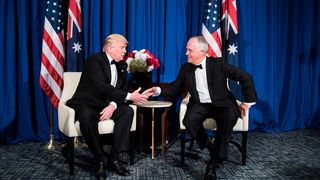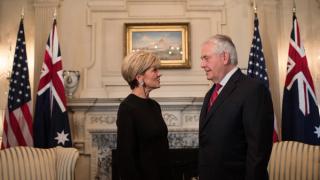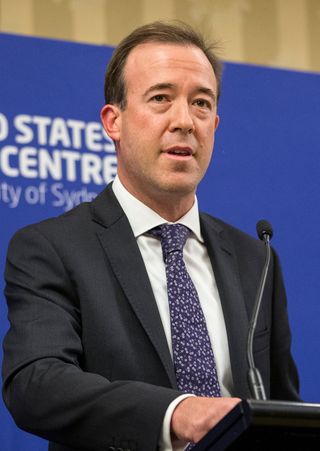Australia has retreated to sentimentalism in dealing with the shock of Donald Trump's election. The other Asian US allies are wary of raising unrealistic expectations of what can be achieved with Trump in office.
Japan, clearly hedging its bets, is pushing to revive the Trans-Pacific Partnership without the United States. The Philippines and Malaysia, seeing no credible US response to China's assertive behaviour in the South China Sea, continue to deal with Beijing directly on territorial disputes.
Yet the Australian government clearly believes that cuddling up to Trump - as demonstrated at the recent leaders' meeting in New York aboard the USS Intrepid - offers some kind of strategic reassurance in an era of volatility. Why?

Canberra's approach is not new. In the last 15 years there has been increasing sentimentality in the US-Australia relationship. Indeed the events in New York probably represent something of a high point in the fusion of the alliance with Australian military mythology, as dinner guests were shown stirring videos drawing a line all the way from Australians and Americans fighting at Le Hamel in 1918 to contemporary conflicts in the Middle East.
At face value, of course, this is no bad thing. But reliance on this particular narrative of the alliance may mislead both the US and Australian publics.
It reinforces the expectation in Washington that Australia will always be there. As one Obama administration official said pointedly in 2015, "all our allies give us headaches, except for Australia. You can always count on Australia".
Perhaps the best way to handle Trump's unpredictability and inexperience on the world stage is to smother him in history, leaving the issues of substance to the senior policy professionals.
Is there any reason to think that this view has changed under a transactional president like Trump? Sure, the pageantry in New York might have well given the President a much-needed lesson on alliances. And the recent AUSMIN meeting in Sydney shows that below the leaders' level, the relationship retains a semblance of normality. But the danger is that Australia is led to believe, perhaps mistakenly, that Trump is now a true believer in the alliance. As his handling of the THAAD issue in South Korea and NATO funding in Europe show, he has not entirely left behind his campaign rhetoric that stressed the need for allies to do and pay more.
It's little wonder then that the insurance premium view of the alliance still reigns supreme in Canberra. The more Australia puts in, so this Cold War thinking goes, the more likely it will be that the United States will come to Australia's defence in an hour of need.
That might be true if there was an outright case of military aggression against Australia. But where the United States has perceived its interests to differ from Australia in Asia, sentiment about the alliance has in the past meant little. Think of the West New Guinea and Confrontation crises in the 1960s, or East Timor in 1999.

Right now, at the very moment when a US president retreats from the language of pax Americana, Australia's Prime Minister and Foreign Minister still talk of the United States of the past rather than the country Australia is dealing with today.
One explanation for this elevation of the sentimental alliance might be the desire of senior bureaucrats in Australia's national security community to preserve it from the whims and vicissitudes of individual leaders.
Perhaps the best way to handle Trump's unpredictability and inexperience on the world stage is to smother him in history, leaving the issues of substance to the senior policy professionals. Seen in that light, the events aboard the Intrepid might best be viewed as an adroit movement of the red cape in front of the American bull.
Now more than ever is the time to emphasise that Australia's peace and prosperity in the region will depend on its relationships not just with Washington, but also with Beijing, Jakarta, Tokyo and New Delhi.
But why does this sentimentalism have such a strong a hold for alliance true believers in Australia?
The answer lies partly with the strategic anxiety surrounding China's rise, and partly with the belief that by appealing to the historic role of the United States in the region, Canberra can somehow arrest isolationist trends in Washington. But there is another, crucial dimension fuelling this emotional rendition of the relationship: the legacy of Iraq.
Among those in Australia who supported the US invasion in 2003 - particularly in the bureaucracy and the commentariat - there is an ongoing need to extract something meaningful from this strategic disaster. They emphasise that Canberra achieved deeper US-Australian military integration, strengthened intelligence links and secured a free trade agreement with the United States. But given the regional strategic environment over the last decade there is every reason to think that the alliance would have developed this way irrespective of whether Australia had sent troops to the Middle East.
Any renewal of the public case for the alliance in Australia has to strike a balance between sentimentalism and realism. The Whitlam, Fraser, Hawke and Keating governments achieved this in both their public language and policy. They stressed the benefits of the alliance but also emphasised that the relationship with Washington alone did not define Australia's global optics.
The forthcoming Australian White Paper on foreign policy presents the opportunity to begin articulating how the country should deal with an inward-looking, nationalist United States. The international order that the United States built after 1945 is not collapsing but it is at a transition point. Now more than ever is the time to emphasise that Australia's peace and prosperity in the region will depend on its relationships not just with Washington, but also with Beijing, Jakarta, Tokyo and New Delhi.
The Trump presidency, in all its swirling chaos and unpredictability, should be providing governments with the very spur they need to refit the alliance for these new circumstances. In doing so, Australia might sensibly eschew the comfort of sentiment and stress once more the need for a more nimble and agile Australian presence in the region and the world.





